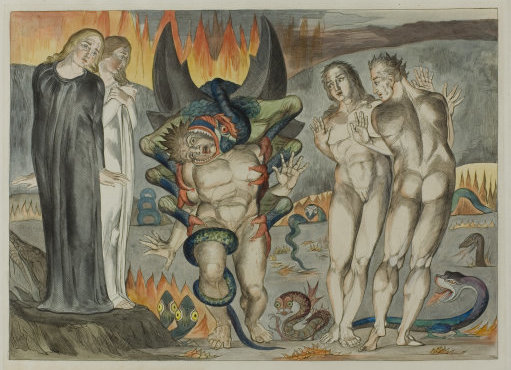In Dantes Inferno, Virgil guides Dante through the nine circles of hell, where sinners are punished. Each circle has a particular punishment that corresponds to sins. Dante converses with the sinners and examines their penalty. The degree and nature of the sin determine the type of punishment. This is called contrapasso. The word contrapasso is a Latin term meaning “suffer the opposite”. Dante uses contrapasso throughout the inferno to establish God’s justice.
In canto 25, Dante enters the eighth circle back on Florence. Dante comes across a centaur that is covered in serpents and a dragon riding his back. The centaur is revealed to be a man named Caucus who was punished for stealing cattle from Hercules. Dante explains this by saying “ He does not follow the same path as his brothers, because he fraudulently stole the great herd he found…”( Alighieri, Canto 25, 28-30). After, three spirits approach Dante asking who he is. A serpent pounces on one of the spirits and wraps itself around them as they speak. The spirits and the serpent begin to merge together. In this canto, thieves were being punished. For their punishment, they are converted into serpents. The punishment and the sin directly relate to each other. Since thieves deprive others of their belongings, their punishment must deprive them of something. The only thing that they have left in hell is their human form which is taken by the serpent. Now the thieves have nothing left. In Dante’s view, God is serving justice by feeding the sinners back their own sins.

The Six-Footed Serpent Attacking Agnolo Brunelleschi
1826–7- William Blake
In canto 32, Dante and Virgil reach the ninth circle of hell. Dante sees a frozen lake with sinners frozen up to their necks. He then sees two spirits close together budding their heads. These spirits are revealed to be brothers who killed each other. This frozen lake is for those who betrayed their own family members. The spirits trapped in ice are a symbol that people who betray others are furthest from God’s warmth. Their punishment is suited for their sin. People who betray other people are cold. They disregard other people’s feelings and do what suits them best. They also don’t care about the connection they have to others. Putting them in a frozen lake would grant them the same coldness that they gave to other people during the betrayal. For example, Dante emphasizes this by saying that “ … from their eyes their wicked hearts exact testimony among them.” ( Alighieri, Canto 32, 38-39). This shows how their “wicked hearts” were linked to being cold by Dante, who described their frozen state as a “testimony. This is considered as a form of retribution for Dante and God.
Overall, Dante’s hell employs contrapasso to demonstrate God’s justice in hell. He also used to show the severity of each sin. The punishment was their own sins being inflicted on them. This aids Dante in bringing order to his hell. There are many other uses of contrapasso in Dante’s inferno.
Alighieri, Dante, Durling, Robert, Martinez, Robert, Turner, Robert. (1996, February 29). The Divine Comedy of Dante Alighieri: Inferno. Oxford University Press USA. Retrieved September 26, 2021, from


